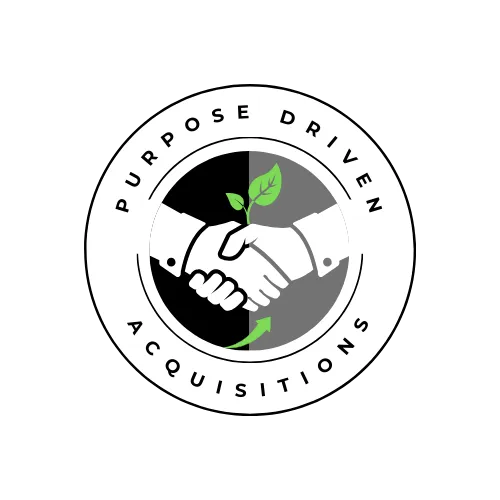
| REQUEST A CALL
Be Prepared to Take On The Next Chapter of Your Life After Business
Let Purpose-Driven Acquisitions Continue Your Business’ Legacy With Our Tailored Solutions
Our Core Values
How We Commit to the Success of Our Clients

Integrity
We uphold the highest standards of honesty and transparency in all our interactions, fostering trust and integrity throughout every business relationship.

Adaptability
In the ever-evolving business landscape, adaptability is our strength. We remain agile and flexible, ensuring we can navigate change and capitalize on emerging opportunities.

Client-Centric Approach
Our clients are at the heart of everything we do. We prioritize your needs, ensuring a tailored and client-centric approach that drives your success.

Long-Term Vision
We adopt a long-term perspective in all our endeavors, aiming to create lasting value for our clients and contributing to their sustained success.
Driving Purpose, Guiding Growth
Are you a business owner ready for a new chapter, seeking growth beyond the ordinary mergers and acquisitions process?
At Purpose Driven Acquisitions, we are here redefine the journey of selling your business. We understand that your decision isn't rooted in distress or retirement; it's about embarking on new adventures, overcoming burnout, or guiding family health matters. When you choose to work with us, we will navigate you through every step with custom solutions to fit your lifestyle.
Are You Looking To Sell Your Business?
Are You Looking to Grow Your Business?
M&A Guidance That Is Beyond a Transaction
Balancing the roller coaster of owning a business and having a fulfilling personal life demands a strategic approach that aligns with your desire for excitement.
Whether prompted by family health concerns or a desire for a more thrilling chapter, Purpose Driven Acquisitions is here to find the solution to the future of your business that caters your exact needs. We offer more than just a business transaction; as we provide a bridge to a future where personal well-being and thrilling adventures can happen simultaneously. Let us navigate the complexities, ensuring your life is beyond satisfactory.
For those feeling the weight of burnout, Purpose Driven Acquisitions offers a lifeline to recharge and rediscover the joy in every twist and turn of life. We understand the toll that exhaustion can take on your abilities to run a business and have a fulfilling personal life . Through a purposeful sale, we will liberate you from the burdens of daily business operations, giving you the freedom to fully immerse yourself in the roller coaster of life. Your journey should be invigorating, not draining – let us pave the way for a revitalized and passion-fueled future.


Stay Up to Date on the Latest Entrepreneurial News & Trends
Check Out Our Latest Blogs For Insights To Apply to Your Business

Selling Your Business to Your Employees: Exploring Employee Stock Ownership Plans (ESOPs)
As a business owner, you've poured your heart and soul into building a successful company. You've navigated challenges, seized opportunities, and created value for your customers, employees, and community. Now, as you consider your exit strategy, you may be wondering about the best way to transition ownership while preserving your legacy and rewarding the people who have been instrumental to your success.
One increasingly popular option is selling your business to your employees through an Employee Stock Ownership Plan (ESOP). In this blog post, we'll explore the benefits, considerations, and process of implementing an ESOP, helping you determine if this exit strategy aligns with your goals and values.
What is an Employee Stock Ownership Plan (ESOP)?
An ESOP is a qualified retirement plan that allows employees to become owners of the company they work for by acquiring company stock. The company contributes shares of its own stock or cash to purchase existing shares, which are then allocated to individual employee accounts within the ESOP trust.
Employees participating in the ESOP earn a beneficial ownership interest in the company, which can grow over time as the company's value increases and as they accumulate more shares through ongoing contributions. Upon retirement or leaving the company, employees can sell their shares back to the ESOP trust, providing them with a valuable source of retirement income.
Benefits of Selling Your Business to Your Employees through an ESOP
1. Preserve Your Legacy and Company Culture
One of the primary advantages of selling your business to your employees through an ESOP is the ability to preserve your company's legacy and culture. Unlike selling to an outside buyer who may have different values or objectives, transitioning ownership to your employees ensures that the company remains in the hands of people who are already invested in its success and familiar with its mission and vision.
An ESOP can help maintain continuity in leadership, operations, and customer relationships, as employees have a vested interest in the long-term success of the company. This can be particularly important for businesses with a strong community presence or unique company culture that is deeply tied to the owner's values and leadership.
2. Reward and Motivate Your Employees
Selling your business to your employees through an ESOP is a powerful way to reward and motivate your team. By giving employees a direct stake in the company's success, you align their interests with those of the business and create a culture of ownership and accountability.
Studies have shown that employee-owned companies often outperform their competitors in terms of productivity, profitability, and employee retention. When employees have a financial stake in the business, they are more likely to go above and beyond in their roles, make decisions that benefit the company's long-term success, and stay with the organization for the long haul.
3. Enjoy Tax Benefits and Financial Flexibility
ESOPs offer several significant tax benefits for both the company and the selling owner. Contributions made to an ESOP are tax-deductible for the company, allowing it to fund the purchase of shares with pre-tax dollars. This can create substantial cash flow advantages and enable the company to allocate more resources towards growth and investment.
For the selling owner, an ESOP can provide a tax-efficient way to transition ownership and potentially defer or minimize capital gains taxes. If the ESOP owns at least 30% of the company's stock and the owner reinvests the sale proceeds into qualified replacement property (QRP), they may be able to defer capital gains taxes indefinitely through a 1042 rollover.
Additionally, ESOPs offer flexibility in terms of the owner's involvement and exit timeline. The owner can sell a portion or all of their shares to the ESOP trust, allowing for a gradual transition of ownership and the ability to maintain some level of control or involvement in the company if desired.
4. Attract and Retain Top Talent
In today's competitive job market, attracting and retaining top talent is a critical challenge for many businesses. An ESOP can be a powerful tool for differentiation and employee recruitment, as it offers a unique benefit that many other companies do not provide.
The opportunity to become an owner and share in the company's success can be a compelling draw for high-performing employees who are looking for more than just a paycheck. ESOPs can foster a sense of pride, engagement, and loyalty among employees, leading to lower turnover rates and a more stable, committed workforce.
Considerations and Challenges of Implementing an ESOP
1. Complexity and Upfront Costs
Implementing an ESOP is a complex process that requires careful planning, structuring, and ongoing administration. The upfront costs associated with establishing an ESOP can be substantial, including legal fees, valuation expenses, and the cost of securing financing for the share purchase.
Business owners considering an ESOP should work closely with experienced legal, financial, and valuation professionals who specialize in ESOP transactions. These advisors can help navigate the complexities of ESOP regulations, ensure compliance with relevant laws and standards, and structure the plan in a way that maximizes benefits for all stakeholders.
2. Valuation and Fairness Considerations
One of the key challenges of implementing an ESOP is determining the fair market value of the company's shares. ESOP transactions require an independent valuation to ensure that the ESOP trust is not overpaying for the shares and that the transaction is fair to all parties involved.
The valuation process can be complex and may involve multiple appraisals and negotiations between the owner, the ESOP trustee, and other stakeholders. It's important to work with experienced valuation professionals who understand the unique considerations of ESOP transactions and can provide a credible and defensible valuation.
3. Ongoing Administration and Fiduciary Responsibilities
Once an ESOP is established, there are ongoing administrative and fiduciary responsibilities that must be managed. The ESOP trustee, who is responsible for managing the ESOP trust and making decisions on behalf of the plan participants, has a legal obligation to act in the best interests of the ESOP participants.
This includes ensuring that the ESOP is properly funded, that participants receive regular communications and account statements, and that distributions are made in accordance with plan rules and regulations. The company must also comply with annual reporting and disclosure requirements, as well as any other relevant laws and regulations.
4. Succession Planning and Leadership Transitions
While an ESOP can provide a valuable tool for ownership transition and succession planning, it's important to consider the potential challenges associated with leadership transitions and ongoing management of the company.
The selling owner may need to work closely with the ESOP trustee and other key stakeholders to develop a clear succession plan and ensure a smooth transition of leadership. This may involve identifying and grooming internal candidates, establishing clear roles and responsibilities, and communicating regularly with employees about the transition process.
Steps to Implement an ESOP
1. Assess Feasibility and Align with Goals
The first step in implementing an ESOP is to assess whether this exit strategy aligns with your personal, financial, and business goals. Consider your timeline for transition, your desired level of ongoing involvement, and your financial needs in retirement.
Work with your advisors to conduct a feasibility study that evaluates the financial and operational readiness of your company for an ESOP. This may involve analyzing cash flow projections, debt capacity, and the potential impact on company culture and employee morale.
2. Establish the ESOP Trust and Plan Documents
Once you've determined that an ESOP is a viable option, the next step is to establish the ESOP trust and develop the plan documents. This involves working with legal counsel to draft the trust agreement, plan document, and other necessary legal agreements.
The plan document will outline the rules and procedures for the ESOP, including eligibility requirements, vesting schedules, distribution policies, and voting rights. The trust agreement will establish the ESOP trust and appoint a trustee to manage the plan assets.
3. Conduct a Valuation and Secure Financing
As mentioned earlier, conducting a fair and independent valuation is a critical step in the ESOP process. Work with a qualified valuation firm to determine the fair market value of your company's shares and establish a pricing structure for the ESOP transaction.
In many cases, the company will need to secure financing to fund the initial share purchase by the ESOP trust. This may involve working with a lender that specializes in ESOP financing and structuring the loan in a way that maximizes tax benefits and cash flow for the company.
4. Communicate with Employees and Implement the Plan
Once the ESOP is established and the transaction is complete, it's important to communicate regularly with employees about the plan and its benefits. Provide education and training to help employees understand how the ESOP works, how their accounts will grow over time, and what their rights and responsibilities are as plan participants.
Implement ongoing communication and engagement strategies to foster a culture of ownership and accountability among employees. This may involve regular company meetings, employee surveys, and opportunities for employees to provide input and feedback on company decisions.
5. Manage Ongoing Administration and Compliance
Finally, ensure that you have the necessary resources and expertise in place to manage the ongoing administration and compliance requirements of the ESOP. This may involve working with a third-party administrator, trustee, or other service providers to handle recordkeeping, participant communications, and regulatory filings.
Regularly review and update the ESOP plan documents and trust agreement to ensure compliance with any changes in laws or regulations. Conduct periodic assessments of the ESOP's performance and make adjustments as needed to optimize benefits for participants and the company.
Conclusion
Selling your business to your employees through an ESOP can be a powerful way to preserve your legacy, reward your team, and ensure the long-term success of your company. By aligning employee interests with those of the business, ESOPs can foster a culture of ownership, engagement, and accountability that drives innovation, productivity, and growth.
However, implementing an ESOP is a complex process that requires careful planning, structuring, and ongoing management. Business owners considering this exit strategy should work closely with experienced ESOP professionals to navigate the legal, financial, and operational considerations and ensure a smooth and successful transition.
Ultimately, the decision to sell your business to your employees through an ESOP is a deeply personal one that requires careful consideration of your goals, values, and priorities. By weighing the potential benefits and challenges, and seeking the guidance of trusted advisors, you can make an informed decision that positions your company and your employees for long-term success.
Our Clients’ Journey in 3 Simple Steps
A Purposeful Partnership from Discovery to Success
Working with Purpose Driven Acquisitions is a client-centric experience through strategic guidance and purposeful collaborations. As we direct you through the intricacies of mergers and acquisitions, our tailored solutions ensure a lasting impact, driving your business towards unparalleled success. The client journey with Purpose Driven Acquisitions is not just a transaction; it's a purposeful partnership focused on elevating your business to new heights.
01
Discover
Explore your business with us, uncovering its unique strengths and challenges. Together, we'll unveil opportunities for transformative growth aligned with your vision.
03
Exit
We will stand by you, ensuring a smooth exit from your business. No matter the path you choose to take, we will be there so you can power through your fresh start with confidence.
02
Acquisition
Next, our experts will craft a purposeful plan for a seamless transition for you. Whether it's elevating your business or exploring new paths, we navigate the complexities of your unique goals.

CONFIDENTIAL
Inquiry
Because It’s Time To Let The Experts Step In
70%
Over 70% of business owners experience burnout before considering an exit.
60%
Nearly 60% of businesses face challenges in finding suitable buyers independently.
45%
Around 45% of businesses lack a clear exit strategy, impacting long-term sustainability.
Purpose Driven Acquisitions alleviates common business owner challenges by offering a guided exit strategy that lifts the weight of burnout, ensuring a seamless transition and a legacy of success. Our expertise in connecting businesses with motivated buyers simplifies the often daunting process of finding suitable partners. Additionally, we address the critical need for a clear exit strategy, providing business owners with a well-defined path to sustained success and long-term sustainability.

